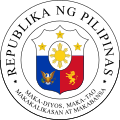Victoria Tauli-Corpuz | |
|---|---|
 | |
| 3rd United Nations Special Rapporteur on the Rights of Indigenous Peoples | |
| In office 2 June 2014 –31 April 2020 | |
| Preceded by | James Anaya ( |
| Succeeded by | JoséFrancisco CalíTzay ( |
| Chairperson,United Nations Permanent Forum on Indigenous Issues | |
| In office May 2005 –April 2010 | |
| Preceded by | Ole Henrik Magga ( |
| Succeeded by | Carlos Mamani Condori ( |
| Personal details | |
| Born | October 19,1952 Besao,Mt. Province,Philippines |
| Alma mater | University of the Philippines Manila |
| Awards | Gabriela Silang Awards (2009) |
Victoria Tauli-Corpuz is a Filipino development consultant and an international indigenous activist of Kankana-ey Igorot ethnicity. [1] [2] From 2014 to 2020,she served as the third United Nations Special Rapporteur on the Rights of Indigenous Peoples.

